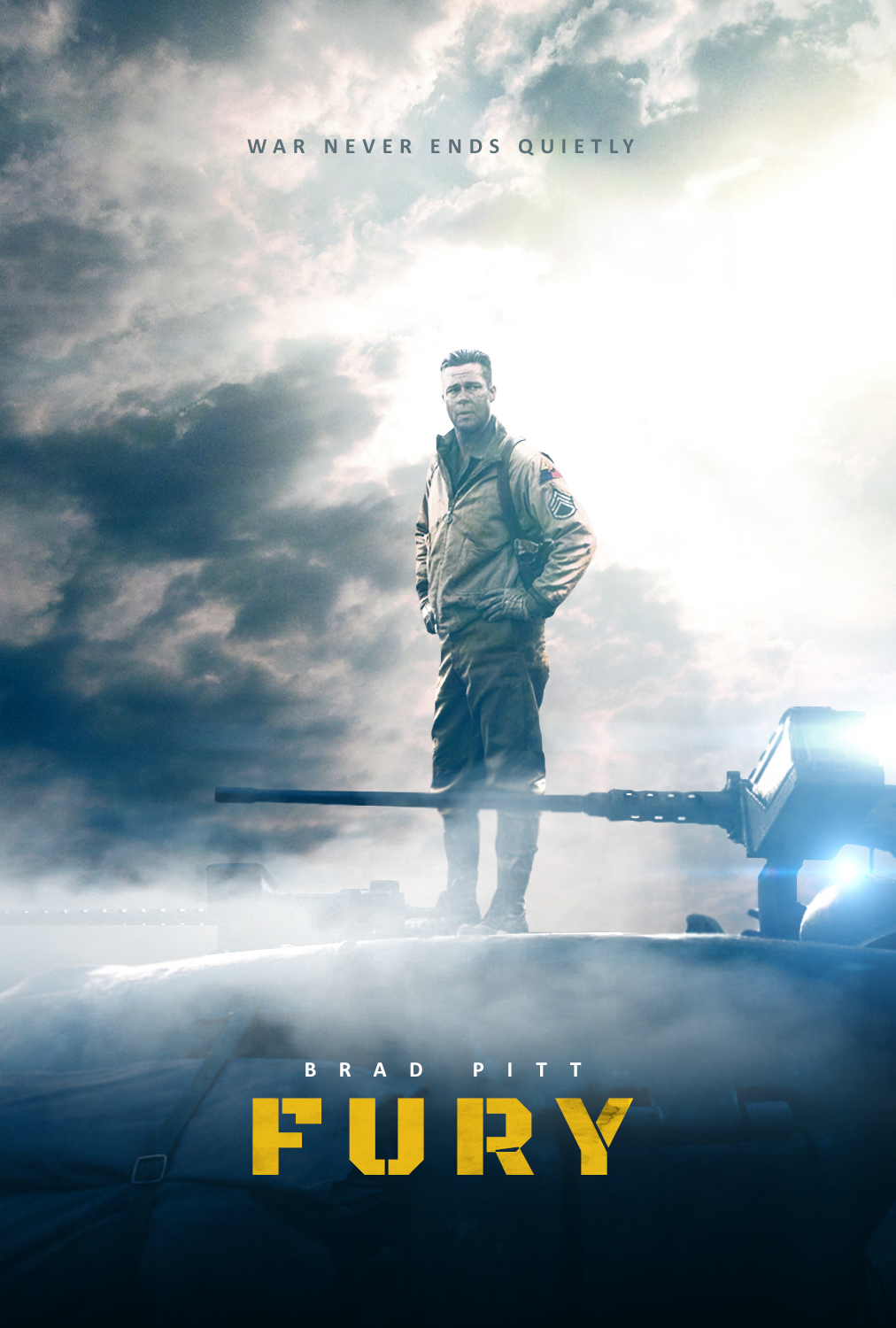
It doesn't matter whether it takes place in France, Germany, ancient Greece or a galaxy far, far away -- war is hell. War movies were my grandma's favorite film genre, so I saw plenty of them growing up. Unfortunately, most of the classics haven't held up so well over time. With that being said and with War for the Planet of the Apes and Dunkirk on the horizon, it seemed like a good time to explore the greatest movies that capture conflict on a grand scale.
10. The Civil War

9. Schindler's List

8. The Pianist
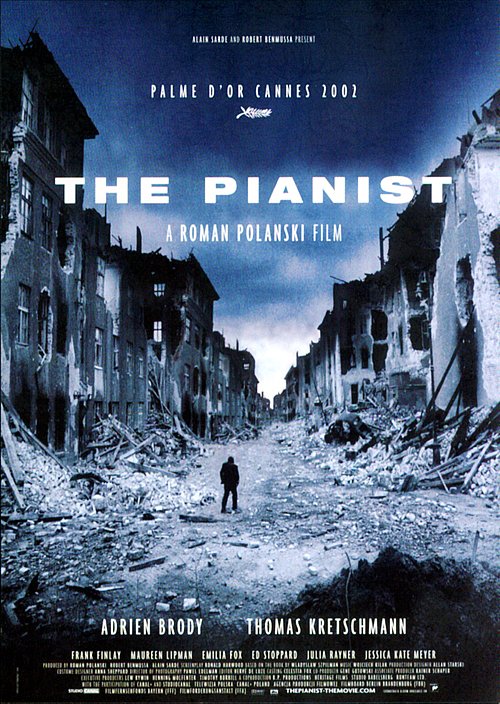
7. 300: Rise of an Empire
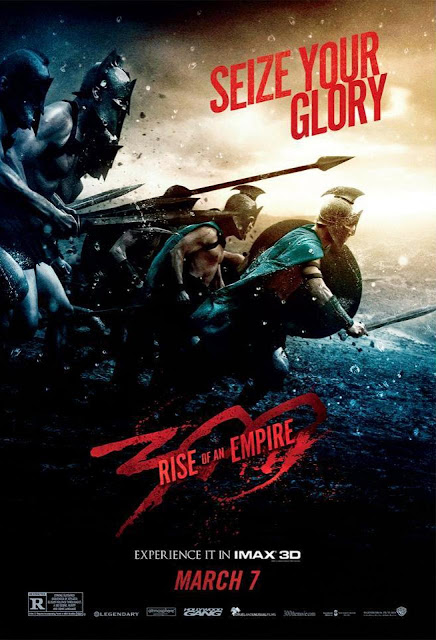
The long-awaited Rise of an Empire was seemingly willed into existence by popular demand following the runaway popularity of 300 (which, not insignificantly, received a standing ovation at it's premiere), which is arguably director Zack Snyder's best film. As everyone who's seen the first film is aware, 300 is a story of martyrdom and self-sacrifice as all but one of the good guys are killed by the end. New director Naom Murro and still-screenwriter Snyder solve the dilemma of crafting a sequel to a film about the slaughter of it's heroes by setting the story (loosely based on historical events) after, before and during the events of the first movie.Naturally, new characters are introduced, but many return from the original as well. While 300 focused on Spartan foot soldiers on land, Rise explores the naval battles waged by their fellow Greeks that took place at around the same time.
The action centers around the conflict between the Greek forces led by the Athenian general Themistocles and the Persian invaders, in part led by Artemisia I of Caria, who was a real naval commander under orders from King Xerxes I. The plan was for a Greek coalition led by Themistocles to repel the Persian invasion at sea at the Straits of Artemisium while a Greek infantry led by King Leonidas I of Sparta held them off at the pass of Thermopylae long enough for reinforcements to arrive. The movie depicts exaggerated and fictionalized versions (especially some over-the-top and absurd scenes involving the perennially nude Eva Green who adds to her unclothed filmography here) of the historical Battle of Marathon, the Battle of Artemisium and the Battle of Salamis in 490 and 480 BC.
Like it's predecessor, which is also based on a graphic novel (an unreleased one in the case of Rise) Rise of an Empire has an R-rating, which allows for more on-screen gore, sex and other relatively more mature content. Unlike the 300s, most comics-derived fare is rated for teens, and as a result unnecessarily talks down to nearly every segment of the audience, while simultaneously failing to overcome the inherent silliness of the subject matter (notable exceptions include the Dark Knight trilogy). Rise also retains the graphic novel-style visual aesthetic and surreal fantasy elements of the original.
Considerable criticism has been aimed at Rise for not living up to the original. The fact is that it's not exactly the same story, but neither is it a forced follow-up patched together in rush by a dozen screenwriters. 300's premise is unique and inherently more compelling simply because everybody kicks the bucket. Since it's based on a true story that involves many of the same people and events, Rise is less a sequel than the second half of the same story. Plus, the element of surprise is gone the second time around. 300 didn't look like anything else out there. If there were no 300, Rise of an Empire would be revolutionary.
6. Edge of Tomorrow

I gotta confess...when I saw the commercial for this movie I figured I'd skip it. I figured it would just be Tom Cruise going through the motions in a dumb, big-budget, glossy attempt to keep up with all the superhero flicks. I was so wrong I ended up going to see it twice. Tom Cruise's third alien invasion movie (and the only one without an assist from Morgan Freeman) is also his best. Edge of Tomorrow surpasses both 2005's critically-embraced (but audience-panned) War of the Worlds and 2013's excellentOblivion. While Worlds mainly focused on the civilian flight from the aliens andOblivion concerned itself with the aftermath of the invasion, Edge is all about the military's role during the war against the invaders. This film also provides much more information about, and glimpses of, the off-worlders.
The heavy and detailed emphasis on the military makes it perhaps the best futuristic war movie of all time (The Empire Strikes Back is set "long, long ago", FYI). The film contains an amusing nod to another memorable sci-fi movie featuring the military as well. I'm not gonna spoil it by telling you which one. There is a significant amount of attention paid to combat training which is not customary at all for sci-fi war films. In this aspect, Edge is rivaled only by Starship Troopers and Edge is a far superior movie. Make no mistake, it is indeed a war movie, complete with Marine culture, scuffed up, tangible-looking high-tech weaponry and it has what could be described as the futuristic version of the opening of Saving Private Ryan. The most distinctive pieces of equipment featured in the film are the various exoskeleton battle suits utilized by the infantry in combat. Incidentally, such suits may not be science fiction for long as real life prototypes for similar types of apparatuses have been recorded as producing such results as lifting more than 200 lbs for the person donning it and walking at least one mile on a full charge.
The performances far exceed expectations as both recognizable faces and otherwise among the cast all manage to wholly disappear into their respective roles. Cruise in particular eschews his usual cocky, sometimes selfless, hotshot onscreen persona in favor of the complete opposite in order to render the cowardly and selfish Major William Cage. Displaying far more talent than is expected in a sci-fi action flick, Cruise really does seem like he's scared shitless and desperate to save his own skin when everything goes to hell. This isn't just "Tom Cruise in a battle suit". He's doing some acting here.Edge of Tomorrow is adapted from a 2004 Japanese novel entitled, "All You Need is Kill", which itself was partly inspired by the author's experience playing video games.
5. The Battle of the Five Armies

The final Hobbit movie (and 2nd-highest grossing film of 2014 worldwide) boasts a refreshingly dark and mostly serious tone (there is one jarringly out-of-place and embarrassingly cheesy joke late in the film - not one person in the theater laughed), which is in stark contrast to most of the goings-on in the previous two installments of the trilogy. I only liked the scenes involving the dragon in the first two movies (which amounted to much less than half of the running time in both cases), so suffice it to say my appreciation of this film was something of a revelation. In scope, sincerity, excitement and maturity The Battle of the Five Armies is actually more on par with the decade-old The Lord of the Rings trilogy than the Hobbit trilogy to which it belongs.
The Five Armies picks up precisely where 2013's The Desolation of Smaug ended: with the dragon Smaug leaving the Lonely Mountain after decades of occupation in order to exact retribution for Bilbo and the Dwarves' attempt to reclaim the treasure that he strong-armed from Thorin Oakenshield's royal grandfather long ago.
Director and co-writer Peter Jackson has received criticism for ultimately deciding to film a trilogy instead of the two-part series that he originally envisioned, the argument being that author J.R.R. Tolkien only devoted a small part of the book to the titular battle -- which is not enough to warrant so much time onscreen. Those who take this position overlook the fact that film is a VISUAL medium, which lends itself to action sequences (such as battles) much more readily than do books. Reading about a fight pales in comparison to watching one. Which is not to say that Five Armies doesn't have it's quiet moments. Funny enough, the one piece of the Hobbit collection named after an involved battle features the most introspection. As great as the Rings trilogy is, Bilbo, Thorin and the others face much more dire consequences and higher stakes in Five Armies that Frodo and the members of this fellowship in those films.
Be sure to be on time at the theater. Not only does the Middle Earth saga go out with quite a bang, the final film begins with one as well.
4. Fury
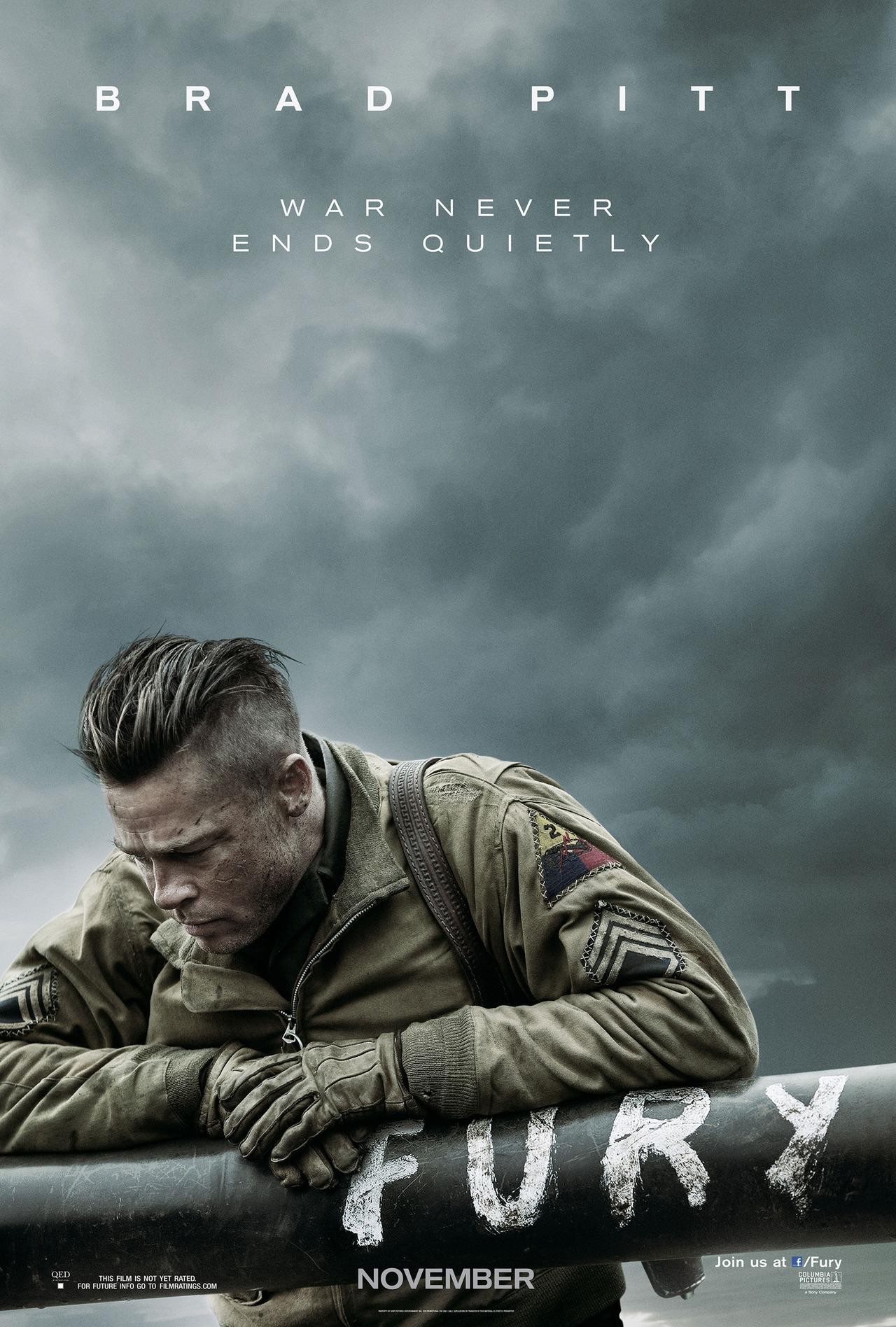

Fury is the best of only four tank films to be produced in the 21st century (if you don't count Fast & Furious 6). Like Saving Private Ryan, the HBO miniseries Band of Brothers and Enemy at the Gates, Fury perfectly captures the grittiness of the second world war. While it lacks the soul of Ryan and Brothers, fortunately it also lacks the contrived, love triangle melodrama of Enemy (the movie's love story appears nowhere in the non-fiction book on which the movie is based).
The film follows an American tank crew in 1945 Germany making it's way to Berlin during the last days of WWII. The title is derived from the nickname given to the tank (a M4A3E8 Sherman model) by the five men who have spent most of the war inside it. The crew belongs to "Hell on Wheels", the nickname given to the U.S. Army's 2nd Armored Division. Not surprisingly, the film picks up on the male bonding amongst the squad but without forcing it or becoming sugary. The main thing that doesn't quite ring true here (besides some highly unlikely battle outcomes given the weaponry involved) is some preachy and hokey dialogue spouted by Brad Pitt's Staff Seargeant Don "Wardaddy" Collier about the meaning and effects of war.
The 134-minute running time belies the film's limited scope, but the restrained reach is a valid choice as it matches the claustrophobic confines of the tank, which comprise much of the crew's world. Fury appropriately pulls no punches in it's representation of the violence and carnage wrought by the Nazis' ill-conceived attempt at world domination. There are also glimpses of Germans living with the reality of their homeland being invaded. Not every war film manages to convey the cliche', "war is hell", but writer/director David Ayer leaves no doubt - which is the very reason the speechifying should've been left out. The visuals and tone get the message across. Pitt, Jon Bernthal, Shia LaBeouf and Jason Isaacs bring to life various veteran soldiers assigned to the U.S. Army's 66th Armored Regiment and invest in them a refreshing credibility. The performances combined with the overall atmosphere and exacting detail to the uniforms, equipment, etc. create the awe-inspiring authenticity which is Fury's greatest strength.
3. Rogue One
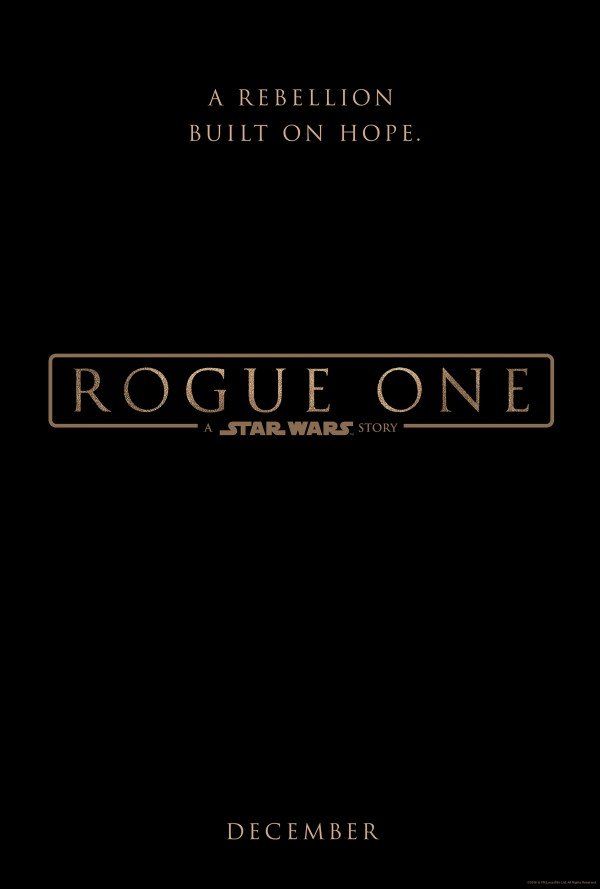
The movie is marketed as a "stand-alone Star Wars story". But that's not really true. In reality, Rogue is a prequel and is key to the events that follow. There's also a small acknowledgement of what came before. But fortunately, it's nothing like those pre-Empire movies. Rogue has more in common with The Empire Strikes Back than those things.
To be honest, it's more like Empire than any other Star Wars movie. Vader is in beast-mode, the good guys aren't angels, there's no teddy-bear army and the "heroes" take extremely heavy losses.
In fact, this movie makes up for the wack stuff in Return of the Jedi. For instance, you get a battle that alternates between land and space -- but without the Care Bears.
Rogue One makes me never wanna watch the prequel trilogy, The Force Awakens or even Return of the Jedi again. Yeah, I said it. I definitely don't give a shit what happens to Kylo Ren, Rey and Poe Dameron in the future. At this point all the Star Wars saga needs is the original, The Empire Strikes Back and Rogue One. There's your new trilogy right there.
Darth Vader is back too. Not a lame, groupie grandkid trying hard to be live up to the family name and not George Lucas' rewritten version of history -- this time the actual, choke-the-shit-out-you-quick, murder-my-own-officers-without-breaking-a-sweat Darth Vader. Not once does he break outta character and yell, "Nooooo!" like he did inRevenge of the Sith and the Special Edition Return of the Jedi (Smh).
Luke Skywalker and Princess Leia aren't the only Rebels with a dad who works for the Empire. Rebel Alliance recruit Jyn Erso's father Galen is the engineer who designed the Death Star. But in keeping with Star Wars tradition, "There is still good in him..." Actually, Galen was pressured into working on the superweapon and he reasoned that if he oversaw the design as opposed to someone else he could sabotage it. He even calls his file containing the details on how to destroy the battlestation "Stardust" -- the nickname he gave his daughter as a little girl.
For her part, Jyn only joins the Rebel Alliance so that she can help the rebels rescue her father from his involuntary work on the project. They want to help him defect because his inside information would prove invaluable. Jyn just wants her dad back -- especially since she also loses her surrogate father, Saw Gerrera, who raised her after Galen was initially pressed into Imperial service.
2. The Empire Strikes Back
The sequel that's far superior to the groundbreaking, revolutionary, blockbuster original. The adventure story that dared to combine substance and integrity with incomparable style. The film that had the gall to let you hear one of it's heroes scream in agony. And to let another of it's heroes fail. And go toe-to-toe with evil and not only lose decisively but to run away. Where an ally reveals himself to be a traitor, but not for reasons as cliche' or superficial as the promise of riches. Where a puppet looked more realistic, had more personality and remains more beloved than any computer-generated character even 35 years later, including The Lord of the Rings' Gollum. Where not one, but two of the hero's mentors display dubious morals -- at best. This is also the film in which the villain takes center stage and gets revenge. It's also the film that visited the most locations in space (the ice planet, the swamp planet, the cloud city, the asteroid and Super Star Destroyer). It has textured, dirty, used, so real-looking-you-swear-you-could-reach-out-and-touch-them spacecraft. It has science (sort of) and sorcery, existentialism and non-cheesy romance. Empire contains the least drastic changes of the trilogy (George Lucas' so-called "improvements" to the films made 20 years after Star Wars' debut), though the Emperor's appearance was thankfully boosted to the caliber of the rest of the visuals. Empire proves that when a film is great, without qualification, it's alright to have a tragic ending. And if you decide to make a sequel, people will show up in droves because they don't just want to know, they want to see, what happens next.
Whether Lucas recognized his limitations or simply found that he was too busy as a newly-independent producer, passing the respective writing and directing reins over to Lawrence Kasdan and his old film school professor, Irvin Kershner, was his wisest decision since bringing his saga to the screen in the first place. Like The Winter Soldier 34 years later, Empire is completely different from its predecessor. The emphasis was re-focused onto character while doubling up on the visuals and excitement. Everything was honed to perfection.
Darth Vader was never better (the same holds true for Boba Fett). He no longer boasts or shouts angrily as he did in Star Wars. His short temper has been replaced by the imperturbable, matter-of-fact malice witnessed in one too-brief scene in Star Wars(where he calmly, telekinetically strangles one of his cohorts at a meeting). He's no longer a caricature with distinctive heavy breathing, he's a so-hardened-he's-irredeemable, barely human warrior who's seen it all and lost the capacity to be moved or impressed. He's the template for The Terminator's T-800 and No Country for Old Men's Anton Chigurh. He's so villainous that he murders his own officers for failing, severs his only son's hand and casually plots to overthrow and murder his mentor. This film reveals the true nature of the galaxy's power structure -- Vader allows the Emperor to sit on the imperial throne -- for now -- but he's really the one calling the shots (a la Dick Cheney or Tony Soprano when Uncle Junior was the New Jersey don). Even his helmet is shinier. This is the king of bad guys at his finest.
The "space opera" takes cues from no less than Shakespeare and Greek tragedy, with a touch of Hamlet and Oedipus Rex. Life was hard for Luke in Star Wars (he was an orphan who found the corpses of his murdered aunt and uncle, watched his mentor die and lost a childhood friend on a suicide mission), but things got worse a mere three years later and he does not make it out in one piece. While he overcame his self-doubts in Star Wars, even more of his personal flaws are revealed here and the villain's restraint and ulterior motives are the only reasons they don't become fatal. Both Yoda and Kenobi use Luke in order to satisfy their desire for revenge. They conceal from him the true nature of the suicide mission for which they are preparing him -- to unwittingly murder his own father. It's worth noting that both chose to live in hiding for decades instead of undertaking said mission themselves. How's that for complexity?
The distinctive score debuted in Star Wars is enhanced, most notably with the addition of the "Imperial March", which netted composer John Williams both a Golden Globe for best soundtrack and a Grammy.
Empire is one of the greatest films of any genre ever made and it's the Michael Jordan of adventure and fantasy films. It's much better than anyone could have ever expected or imagined it to be. Critics that likened Guardians of the Galaxy to Star Wars films could not have been referring to this one. They must have had Attack of the Clones in mind. The Empire Strikes Back is so good that it's not merely the best fantasy film. It should be referred to as the fantasy film.
1. Saving Private Ryan
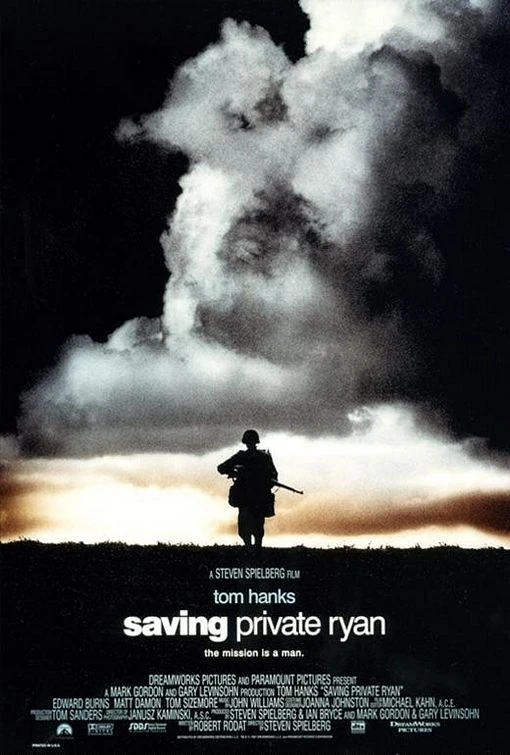
Surprisingly inspired by true events, Saving Private Ryan is all about a mission to find the last surviving son of the Ryan family and send him home from the war alive and well. It is without a doubt the best military film of all time and legendary director Steven Spielberg's best work.
Over the protests of the surviving men under his command, Captain John H. Miller is tasked with the mission to rescue the last living Ryan brother (two of his brothers were KIA on the beach at Normandy and the third was killed by the Japanese in New Guinea) of an Iowa family from behind enemy lines before a German mortar round or bullet finds him first. Captain Miller receives the assignment after leading the remaining members of his squad from the 2nd Ranger Battalion of the 29th Infantry Division through the landing at Omaha Beach during the D-Day invasion, during which American casualties numbered over 2,000.
First, they must find Private James Francis Ryan, a paratrooper and member of the 101st Airborne Division, who may or may not still be alive and who could've landed almost anywhere in the French countryside.
Like I said, the movie is loosely based on a true story. During WWII, the Army sent Fritz Niland home early after his three brothers were reported KIA. Fortunately, reports of Fritz's brother Edward's death turned out to be unfounded. He made it back home to America as well after escaping a Japanese prison camp.

No comments:
Post a Comment